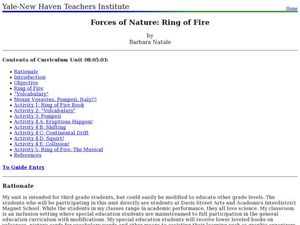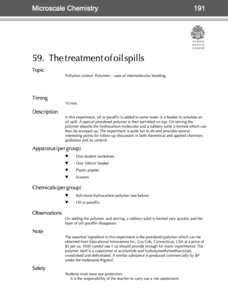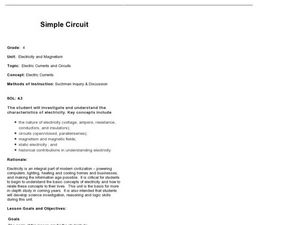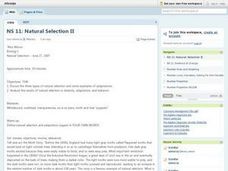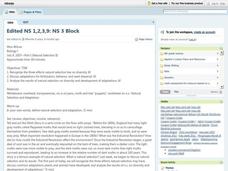National Science Teacher Association
Middle School Sampler: Science
Focus on inquiry-based learning in your science class with a series of activities designed for middle schoolers. A helpful packet samples four different texts, which include activities about predator-prey relationships, Earth's axis...
Curated OER
What Is Natural?
Your junior highers will learn about which objects are natural and classify objects as abiotic or biotic. Your class will trace human products to their natural resources using matter cycles and then create their own definition of nature.
Howard Hughes Medical Institute
Lesson 3: Scientific Inquiry with WildCam Gorongosa
When biologists installed cameras in Gorongosa National Park, they ended up viewing a lot more than the lions they were trying to help! Young ecologists observe one of Africa's most beautiful savanna regions with interactive trail camera...
Howard Hughes Medical Institute
Scientific Inquiry Using WildCam Gorongosa
How do scientists determine what questions to ask to meet their research goals? Help your class develop an inquiry mindset with a lesson based on studies in the Gorongosa National Park. Partners create their own research questions by...
G. Turrell
Science Activity 2: Light & Sound
Little learners experiment with sunlight and map out how light travels. Using a mirror and slotted card, they find out about items that can reflect or absorb the light. They experiment with a variety of materials to find out how light...
Howard Hughes Medical Institute
Gorongosa: Scientific Inquiry and Data Analysis
How does the scientific process begin? Introduce ecology scholars to scientific inquiry through an insightful, data-driven lesson. Partners examine data from an ongoing research study to determine the questions it answers. The resource...
California Academy of Science
Human Evolution
As the great and hilarious Tim Minchin once said, "Science is simply the word we use to describe a method of organizing our curiosity." Science is more than just a guess; it is based on questions, observations, and evidence. High...
Curated OER
Natural Disasters
Students read the book "Tsunami!" and discuss natural disasters and how they can prepare. This lesson is much more than a study of tsunamis. The lesson is chock-full of ways to study the Japanese culture across the curriculum. There are...
Curated OER
Real-World Projects: Challenges from the Polymer Industry
Two scenarios are presented for chemistry detectives to decipher. Both require the use of an infrared spectrometer and focus on the examination of polymer materials. In the first, lumps in polyethylene bottles are analyzed. In the...
Curated OER
Forces of Nature: Ring of Fire
Third graders will research the Ring of Fire and be able to share their findings with their partner. They will also demonstrate volcanic eruptions using a baking soda and vinegar volcano model. Then they will discover how continental...
Curated OER
Changes in Nature
The goal of this science instructional activity is to have youngsters be able to identify the physical and chemical changes in the carbon cycle, and water cycle due to weathering. The in-class inquiry/experiment is quite interesting and...
Curated OER
Pre-Activity Worksheet: Natural Selection
Although the instructions include reading from a specific textbook, the tasks are appropriate for any unit dealing with how genotype frequency changes over time. Junior biologists define five vocabulary terms and then answer five...
Curated OER
The Origin of Life: Alternative Views
Students explore the topics of faith and science as they relate to the origins of life. They consider the major points of Darwin's Theory of Evolution and brainstorm various explanations of how life began. Students investigate different...
Royal Society of Chemistry
The Treatment of Oil Spills—Microscale Chemistry
When oil spills happen, how is the oil cleaned up? Pupils of polymer science discover an amazing substance that turns oil into a solid during a microscale experiment. Individuals observe oil or paraffin before and after addition of the...
NASA
Things Are Not Always What They Seem
Science is magic that works. Magical color-changing beads and a coffee can that follows voice commands are just two examples of magic tricks that rely on science. After completing a hands-on activity and an experiment investigating the...
Curated OER
Science Current Events
Seventh graders write science current events articles using various media sources.
Concord Consortium
The Volume-Pressure Relationship
Pressure and volume are in a relationship, but what is the nature of it? High school scientists discover the link between the volume of a gas and the pressure it exerts using a simulation. The resource tracks pressure in a sidebar as...
Howard Hughes Medical Institute
Gorongosa: Making Observations Activity
Do you have young scientists wanting to make new discoveries rather than just completing the same experiments? Young scientists use their observational skills to identify animals and patterns in animal behavior. Through tracking...
Curated OER
Simple Circuit: Electric Currents and Circuits
Through inquiry and exploration, 4th graders will learn and understand the functions of open and closed circuits. They will break into 2 groups, define vocabulary, hypothesize how to light a bulb, then test their hypothesis 4 different...
Curated OER
The Joy of Natural Disasters
Simulate a natural disaster to inspire problem-solving, collaboration, creativity, and teamwork.
Curated OER
Where is the Science?: Design as an Introduction to the Scientific Method
Young scholars work to create a design that will protect an egg from being dropped from a one story floor. They test their prototype after it is completed. They write clear instructions and link aspects of the design process to the...
Cornell Lab of Ornithology
Amazing Birds
What's so amazing about birds? Find out just how amazing birds are with a physics of animal behavior unit created by Cornell Lab of Ornithology. Have learners explore and tap into their observational skills and notice how birds fly, what...
Curated OER
Natural Selection II
Pupils participate in a discussion about the three types of natural selection. In groups, they identify examples of adaptations from photographs. To end the lesson, they analyze results of natural selection in adaptation, behaviors and...
Curated OER
Natural Selection And Evolution
Students investigate the concept of evolution and how natural selection is used as an indicator that evolution has happened. They recognize the three effects it has on diversity and how adaptations can develop. Diversity is explained as...











